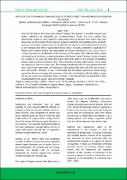Application of Markov chain Modelto foreign debt management in Nigerian economy

View/
Date
2016Author
Ngaloru, Stellamaris Ngozi
Abdulazeez, Halimat
Ebuk, Love E.
Adiukwu, Roseline N
Nafiu, Lukman Abiodun
Metadata
Show full item recordAbstract
ARTICLE ABSTRACT
Since the last century, there have been marked changes in the approach to scientific enquiries and greater realisation that probability (or non-deterministic) models are more realistic than deterministic models in many situations. Observations taken at different time points rather than those taken at a fixed period of time began to engage the attention of probabilists. Many stochastic processes occurring in social sciences are studied now not only as a random phenomenon but also as one changing with time or space called Markov chain. This study considered an application of Markov chain model to predict future debt pattern as effective management of any nation’s debt is crucial to growth and development of the economy of that nation. We collected data on debts maintained by all the thirty-six states governments and Federal Capital Territory, Abuja in Nigeria for a period of six years and determined future debt trend based on the transition probabilities between various groups of transition states. Three noticeable transition states namely; rising, stable and dropping of debt trend were used. The findings revealed that 55% of states governments will have a rise in their debt profile, 6% will have a stable debt profile while 39% will have a drop in their debt profile. Therefore, it was recommended that the federal government should design appropriate financing strategies that guarantee a debt path matching loan with the ability to repay and put up a policy as a preventive action to reduce, in the medium term, the possibility of debt unsustainability by the various states governments in Nigeria.
